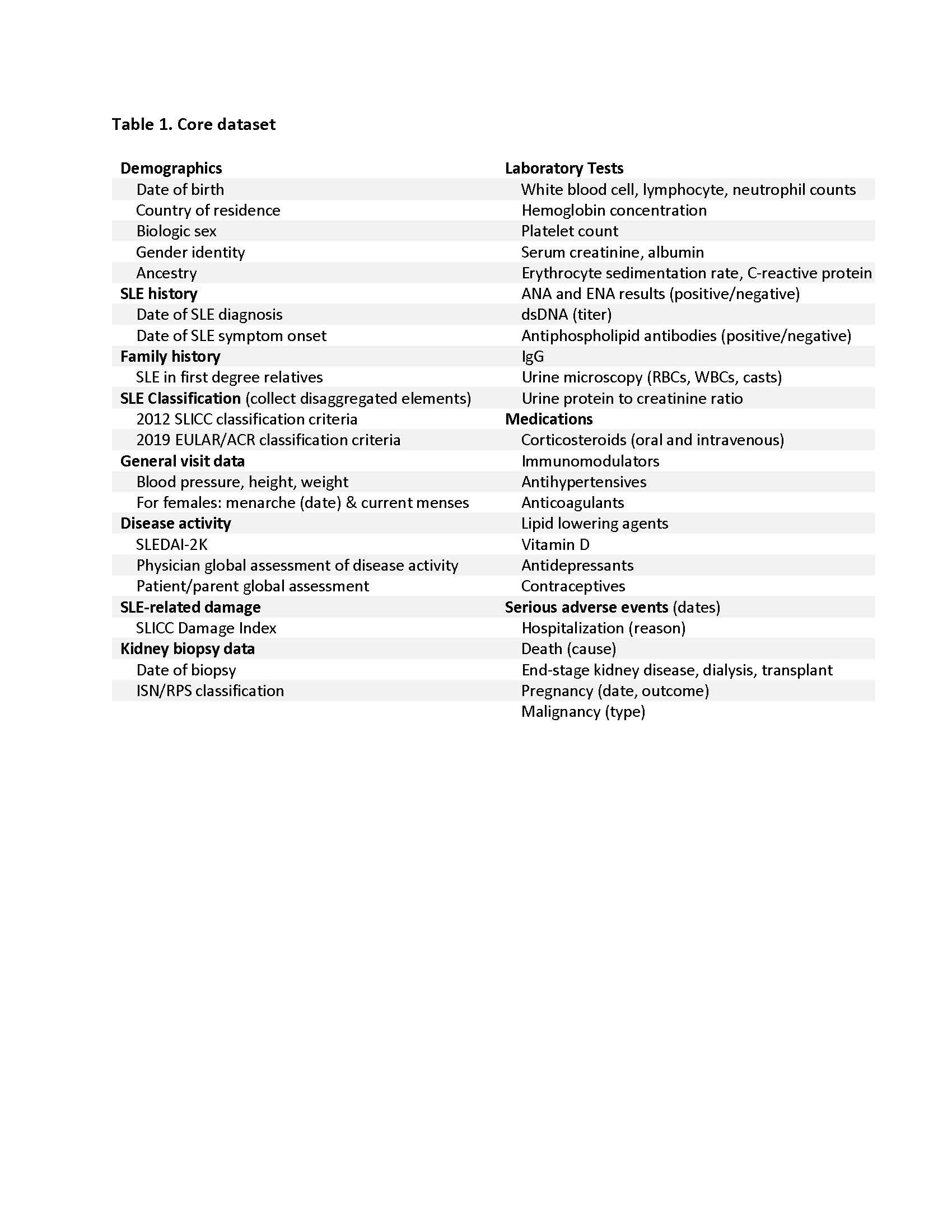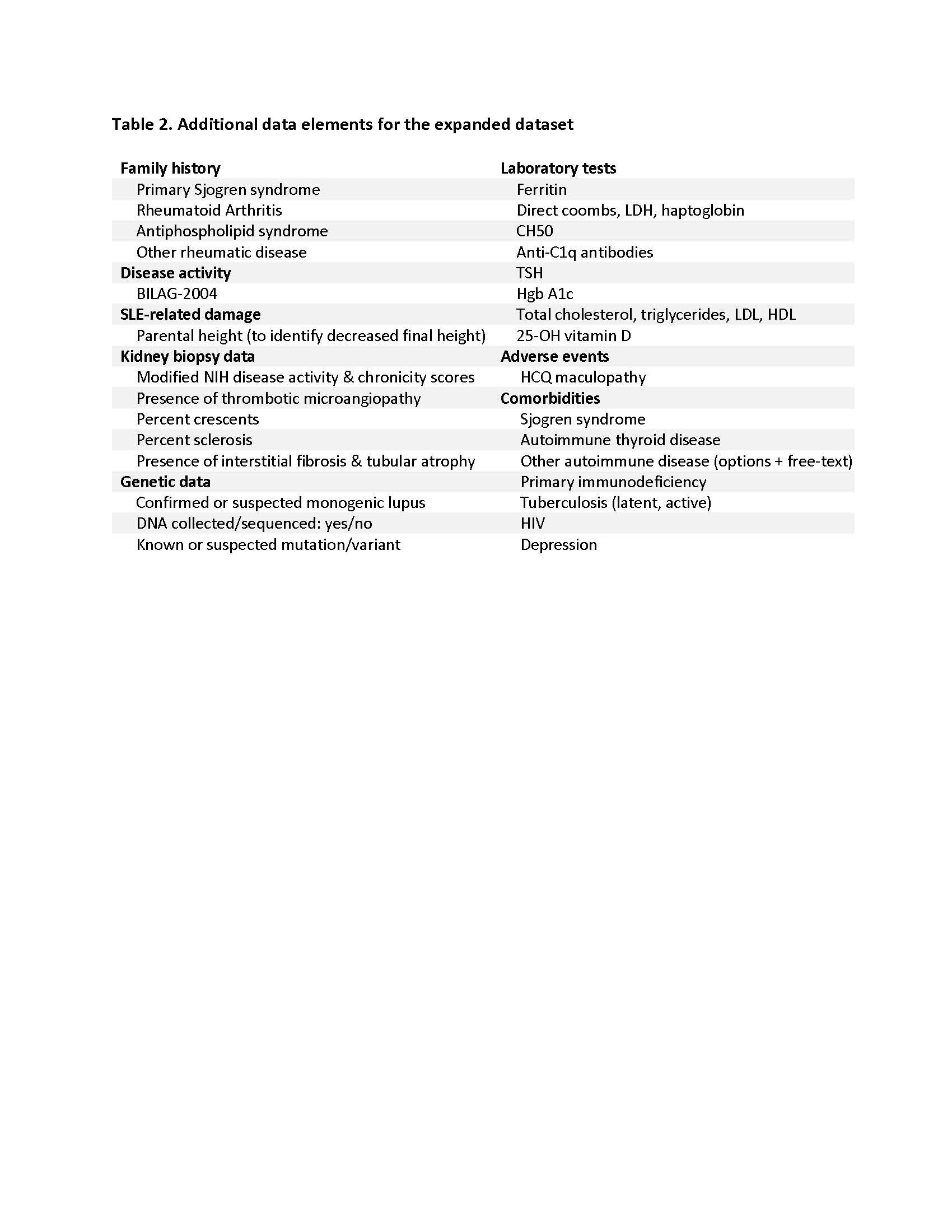Session Information
Date: Sunday, November 13, 2022
Title: Pediatric Rheumatology – Clinical Poster II: Connective Tissue Disease
Session Type: Poster Session C
Session Time: 1:00PM-3:00PM
Background/Purpose: Childhood-onset systemic lupus erythematosus (cSLE) occurs in approximately 20% of all SLE cases. cSLE is has a worse prognosis than adult-onset SLE, often requiring more aggressive therapy. The Childhood Arthritis and Rheumatology Research Alliance (CARRA) coordinates a collaborative cSLE registry for patients in the US and Canada. Additional registries capture cSLE data in the United Kingdom (UK JSLE Registry) and throughout Europe (JIR Registry). To date, differences in data fields and collection methodology have been barriers to collaborative inter-registry research, whereas inter-registry research would enhance patient numbers and improve research quality. Our aim was to develop two standardized datasets to facilitate international registry-based cSLE research. Firstly, a minimum “core” dataset that would be feasible for SLE research at centers without data entry support, and secondly an “expanded” dataset that is more comprehensive and designed for use in centers with more established research infrastructure.
Methods: SLE experts (15 pediatric rheumatologists, 4 combined pediatric and adult rheumatologists, 2 pediatric nephrologists) with international representation (10 countries; 5 continents) participated in two Delphi questionnaires followed by an 8-hour virtual consensus meeting. Four patients/caregivers also attended the virtual consensus meeting with equal votes. Final data elements for the core and expanded datasets were determined using adapted nominal group technique and voting, with consensus requiring ³ 80% agreement.
Results: Twenty (95%) experts responded to the first Delphi questionnaire and 21 (100%) to the second questionnaire. Twenty-one physicians and 4 patients/caregivers attended the consensus meeting, all with equal votes. The group achieved consensus for core (Table 1) and expanded (Table 2) data elements in the following areas: demographics, SLE history, co-morbidities, family history, SLE classification criteria, visit data, laboratory testing, kidney biopsy data, disease activity measurements, damage index, medications, and serious adverse events. In addition, consensus was achieved regarding frequency of data collection (every 3 months + flare visits).
Conclusion: Standardized core and expanded datasets for registry-based international cSLE research were defined by global expert consensus. These datasets consider unique aspects of children with SLE in a range of geographic and resourced settings. The core and expanded datasets will facilitate international collaborative research for children and adolescents with SLE worldwide.
To cite this abstract in AMA style:
Sadun R, Lewandowski L, Belot A, Smith E, Cooper J. Development of Core and Expanded Datasets to Align Registries and Advance International Collaborative Research for Childhood-onset Systemic Lupus Erythematosus [abstract]. Arthritis Rheumatol. 2022; 74 (suppl 9). https://acrabstracts.org/abstract/development-of-core-and-expanded-datasets-to-align-registries-and-advance-international-collaborative-research-for-childhood-onset-systemic-lupus-erythematosus/. Accessed .« Back to ACR Convergence 2022
ACR Meeting Abstracts - https://acrabstracts.org/abstract/development-of-core-and-expanded-datasets-to-align-registries-and-advance-international-collaborative-research-for-childhood-onset-systemic-lupus-erythematosus/


